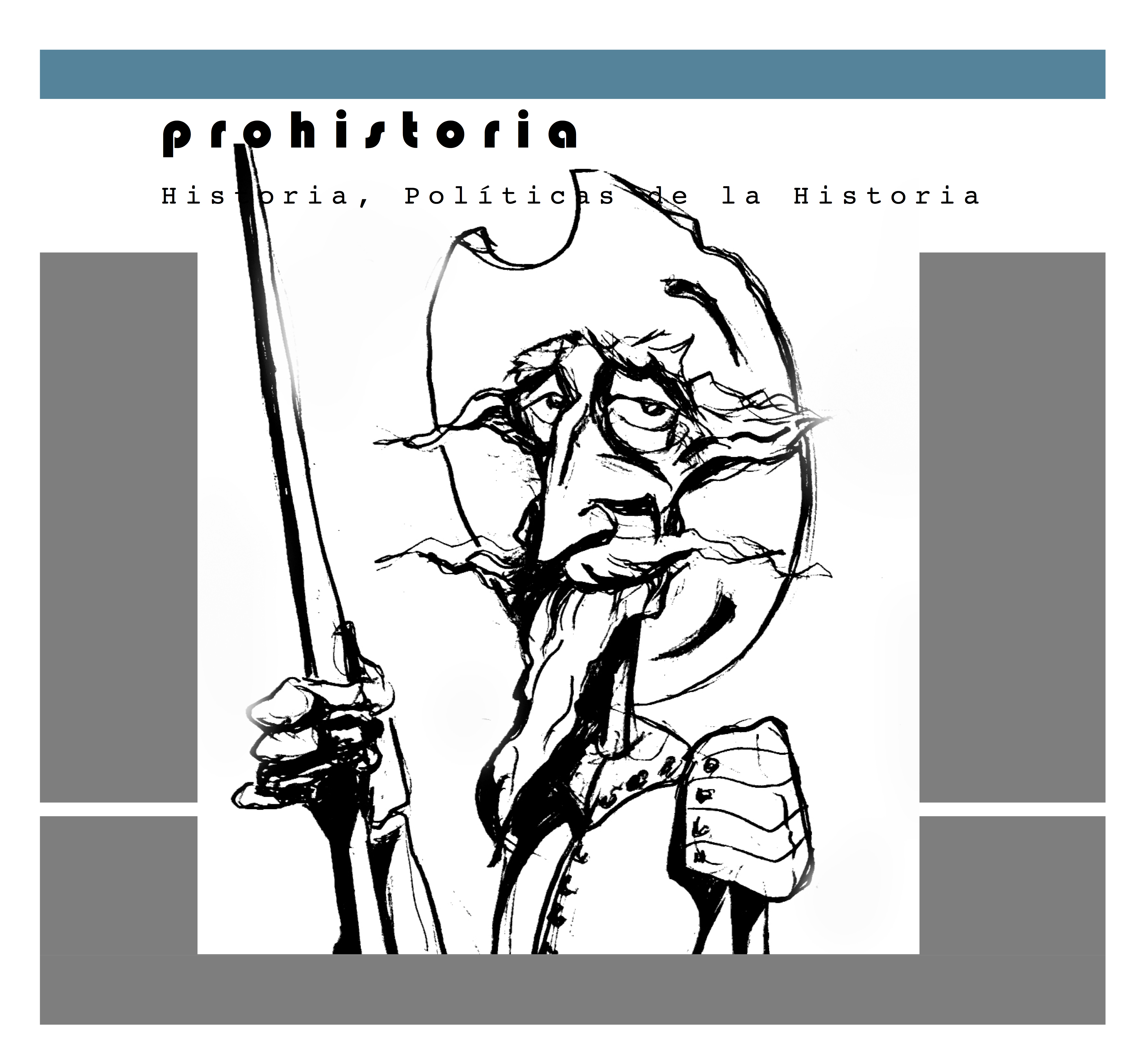La organización de la violencia militar en el siglo XXI
DOI:
https://doi.org/10.35305/prohistoria.vi35.1413Palabras clave:
Coerción, Ideología, Solidaridad Grupal, Poder Organizativo, Violencia Militar, GuerraResumen
El artículo analiza las bases sociológicas de la violencia militar en el siglo XXI. En la primera parte, se debaten críticamente los tres enfoques contemporáneos que son dominantes en la explicación de la violencia organizada: a) la perspectiva del declive de la violencia, b) el enfoque de las “nuevas guerras” y c) la aproximación del desplazamiento tecnológico. Se sostiene que, a pesar de sus indiscutibles fortalezas, estas perspectivas no proporcionan una interpretación adecuada de los cambios sociales contemporáneos. En particular, se cuestiona su énfasis en la ruptura radical en el carácter de la violencia militar contemporánea en comparación con otros periodos históricos. En la segunda parte el artículo se desarrolla una visión alternativa, sociológica y de larga duración, centrada en el papel de los poderes coercitivos, ideológicos y micro-interactivos en la transformación de la violencia militar. En oposición a las tres perspectivas dominantes, se argumenta que la violencia organizada en el siglo XXI se ha transformado pero exhibe aún mucha más continuidad con los tres últimos siglos de lo que se viene asumiendo. Concretamente, se enfatiza el impacto a largo plazo de tres procesos históricos que han dado forma a la dinámica de la violencia militar: la burocratización acumulativa de la coerción, la ideologización centrífuga y el envolvimiento de micro-solidaridades.
Descargas
Citas
Alperovitz, Gar (1995). The Decision to Use the Atomic Bomb, New York: Albert Knopf.
Arkin, Ronald C. (2011). “Military Robotics and the Robotics Community’s Responsibility”, en Industrial Robotics, 38 (5): 1973.
Bauman, Zygmunt (2002). Society under Siege, Cambridge: Polity.
Bauman, Zygmunt (2006). Liquid Fear, Cambridge: Polity.
Bender, Jeremy (2015). “‘They’d love to do damage’: The FBI says ISIS wants to go after one of America’s biggest vulnerabilities”, en Business Insider UK. Disponible en: http://uk.businessinsider.com/isis-and-hacking-us-power-grid-2015-10?r=US&IR=T.
Bourke, Joanna (2000). An Intimate History of Killing, London: Granta.
Broadbridge, Anne (2008). Kingship and Ideology in the Islamic and Mongol Worlds, Cambridge: Cambridge University Press.
Childs, John (2005). “The Military Revolution I: The Transition to Modern Warfare”, en Townshend, Charles (ed.) The Oxford History of Modern Warfare, Oxford: Oxford University Press.
Cirillo, Pasquale y Taleb, Nassim (2017). “On the Statistical Properties and Tail Risk of Violent Conflicts”, en Physica A: Statistical Mechanics and its Applications [in press].
Clausewitz, Carl von (1997 [1832]). On War, Ware: Wordsworth.
Coker, Christopher (2013). Warrior Geeks, London: Hurst.
Collins, Randall (2008). Violence: A Micro-Sociological Theory, Princeton: Princeton University Press.
De Landa, Manuel (1991). War in the Age of Intelligent Machines. New York: Swerve Editions.
Della Porta, Donatella (2013). Clandestine Political Violence, Cambridge: Cambridge University Press.
Dolman, Everett (2015). Can Science End War? Cambridge: Polity.
Duffield, Mark (2001). Global Governance and the New Wars, London: Zed.
Elias, Nobert (2000[1939]). The Civilising Process: Sociogenetic and Psychogenetic Investigations, London: Blackwell.
Fazal, Tanisha M. (2014) “Dead Wrong? Battle Deaths, Military Medicine, and Exaggerated Reports of War’s Demise”, en International Security, 39 (1): 95-125.
Foucault, Michel (1975). Discipline and Punish. The Birth of Prison, London: Penguin.
Foucault, Michel (2003). Society Must Be Defended: Lectures at the College de France 1975-1976, New York: Picador.
Fry, Douglas S. (2007). Beyond War, Oxford: Oxford University Press.
Fry, Douglas S. y Sorderberg, Patrik (2013). “Lethal Aggression in Mobile Forager Bands and Implications for the Origins of War”, en Science 341 (6143): 270-273.
Gat, Azar (2013). “Is War Declining – And Why?”, en Journal of Peace Research, 50 (2): 149-157.
Gellner, Ernest (1983). Nations and Nationalism, Ithaca NY: Cornell University Press.
Giddens, Anthony (1986). The Nation-State and Violence, Cambridge: Polity.
Goldstein, Joshua (2011). Winning the War on War: The Decline of Armed Conflict Worldwide, New York: Dutton.
Grossman Dave (1996). On Killing: The Psychological Cost of Learning to Kill in
War and Society, Boston: Little, Brown.
Gudkov, Gennady (2015). “Russian Nomenklatura 5 Times Larger, More Privileged. More Dangerous than Soviet Predecessor”, The Interpreter, October 24, 2015; https://www.interpretermag.com/russian-nomenklatura-five-times-larger-more-privileged-and-more-dangerous-than-its-soviet-predecessor-gudkov-says/
Guthrie, R. Dale (2005). The Nature of Palaeolithic Art, Chicago: Chicago University Press.
Hall, John A. (1985) Powers and Liberties, London: Blackwell.
Hirst, Paul (2001). War and Power in the 21st Century, Cambridge: Polity.
Hixson Walter (2003). The American Experience in World War II: The Atomic Bomb in History and Memory, London: Routledge.
Holmes, Richard (1985). Acts of War, New York: Free Press.
Horgan, John (2012). The End of War, New York: McSweeney.
Kaldor, Mary (2003). Global Civil Society: An Answer to War, Cambridge: Polity.
Kaldor, Mary (2007). New and Old Wars: Organised Violence in a Global Era, Cambridge: Polity.
Kaldor, Mary (2013). “In Defence of New Wars”, en Stability 2 (1):4, http://doi.org/10.5334/sta.at
Kalyvas, Stathis (2001). “‘New’ and ‘Old’ Civil Wars: A Valid Distinction?”, en World Politics, 54: 99-118.
Low, Bobbi (1993). “An Evolutionary Perspective on War”, en Zimmerman, William y Jacobsen, Harold (eds.) Behavior, Culture and Conflict in World Politics, pp. 13-55. Ann Arbor: University of Michigan Press.
Machiavelli, Niccolo (1997 [1532]). The Prince, Ware: Wordsworth.
Malešević, Siniša (2010). The Sociology of War and Violence, Cambridge: Cambridge University Press.
Malešević, Siniša (2013a). Nation-States and Nationalisms: Organisation, Ideology and Solidarity, Cambridge: Polity.
Malešević, Siniša (2013b). “Forms of Brutality: Towards a Historical Sociology of Violence”, en European Journal of Social Theory, 16 (3): 273 - 291.
Malešević, Siniša (2014). “Is War Becoming Obsolete? A Sociological Analysis”, en Sociological Review 62 (2): 65-86.
Malešević, Siniša (2015). “Where does Group Solidarity Come from? Gellner and Ibn Khaldun Revisited”, en Thesis Eleven, 128 (1): 85-99.
Malešević, Siniša (2016). “Nationalism and Military Power in 20th Century and Beyond”, en Schroeder, Ralph (ed) Global Powers: Mann’s Anatomy of the 20th Century and Beyond, Cambridge: Cambridge University Press.
Malešević, Siniša (2017). The Rise of Organised Brutality: A Historical Sociology of Violence, Cambridge: Cambridge University Press [edición en español: (2020) El auge de la brutalidad organizada. Una sociología histórica de la violencia, Universitat de València]
Mann, Michael (1986). The Sources of Social Power I: A History of Power from the Beginning to AD 1760, Cambridge: Cambridge University Press.
Mann, Michael (1993). The Sources of Social Power II: The Rise of Classes and Nation States 1760-1914, Cambridge: Cambridge University Press.
Mann, Michael (2012). The Sources of Social Power III: Global Empires and Revolution, 1890-1945, Cambridge: Cambridge University Press.
Mann, Michael (2013). The Sources of Social Power IV: Globalizations 1945-2011, Cambridge: Cambridge University Press.
Mearsheimer, John J. (2001). The Tragedy of Great Power Politics, New York: W.W. Norton.
Meyer, John; Boli, John; Thomas, George y Ramirez, Francisco (1997). “World Society and the Nation-State”, en American Journal of Sociology 103 (1): 144-81.
Meyer, John; Ramírez, Francisco y Soysal, Yasemin Nuhoḡlu (1992). “World Expansion of Mass Education, 1870-1970”, en Sociology of Education 65: 128-49.
Midlarsky, Manus (2011). Origins of Political Extremism: Mass Violence in the Twentieth Century and Beyond, New York: Cambridge University Press.
Morris, Ian (2014). War! What is it Good For?: Conflict and the Progress of Civilization from Primates to Robots, New York: Berghahn Books.
Mueller, John (2009). “War Has Almost Ceased to Exist: An Assessment”, en Political Science Quarterly. 124 (2): 297-321.
Munkler, Herfried (2004). The New Wars, Cambridge: Polity.
Newman, Edward (2004). “The ‘New Wars’ Debate: A Historical Perspective is Needed”, en Security Dialogue. 35 (2): 173-189.
Pinker, Steven (2011). The Better Angels of Our Nature: Why Violence has Declined? New York: Allan Lane.
Sageman, Marc (2004). Understanding Terror Networks Philadelphia: University of Pennsylvania Press.
Singer, Peter Warren (2009). Wired for War: The Robotics Revolution and Conflict in the 21st Century. London: Penguin.
Singer, Peter Warren y Friedman, Allan (2014). Cybersecurity and Cyberwar: What Everyone Needs to Know, Oxford: Oxford University Press.
SIPRI Military Expenditure Database (2013). http://www.pgpf.org/Chart-Archive/0053_defense-comparison#sthash.cgDq2KLF.dpuf
Smith, Roger W. (1999). “State Power and Genocidal Intent”, en Chorbajian, Levon y Shirinian, George (eds). Studies in Comparative Genocide, London: Macmillan.
Thornborrow, Thomas y Brown, Andrew (2009). “Being Regimented: Aspiration, Discipline and Idenity Work in the British Parachute Regiment”, en Organizational Studies 30 (4): 355-376.
Tilly, Charles (1985). “War Making and State making as Organized Crime”, en Evans, Peter; Rueschemeyer, Dietrich y Skocpol, Theda (eds.) Bringing the State Back In, Cambridge: Cambridge University Press.
Tin-Bor Hui, Victoria (2005). War and State Formation in Ancient China and Early Modern Europe, Cambridge: Cambridge University Press.
Turner, Jonathan (2007). Human Emotions: A Sociological Theory, London: Routledge.
Virilio, Paul (1997). Pure War, New York: Semiotext(e).
Virilio, Paul (2006). Speed and Politics, Cambridge, MA: MIT Press.
Waltz, Kenneth (2008). Realism and International Politics, London: Routledge.
Weber, Max (1968). Economy and Society, New York: Bedminster Press.
White, R. W. (2000). “Issues in the Study of Political Violence: Understanding the Motives of Participants in Small Group Political Violence”, Terrorism and Political Violence, 12(1): 95-108.
Publicado
Cómo citar
Número
Sección
Licencia

Esta obra está bajo una licencia internacional Creative Commons Atribución-NoComercial-CompartirIgual 4.0.
-
Los autores conservan los derechos de autor y garantizan a la revista el derecho de ser la primera publicación del trabajo al igual que licenciado bajo una Creative Commons Attribution License.
-
Los autores pueden establecer por separado acuerdos adicionales para la distribución no exclusiva de la versión de la obra publicada en la revista (por ejemplo, situarlo en un repositorio institucional o publicarlo en un libro), con un reconocimiento de su publicación inicial en esta revista.
Copyright de este número © Prohistoria. Historia, políticas de la historia












































